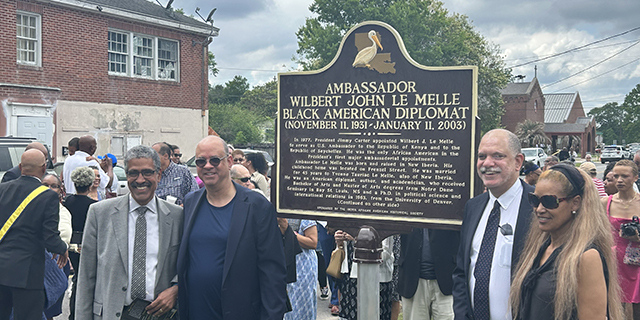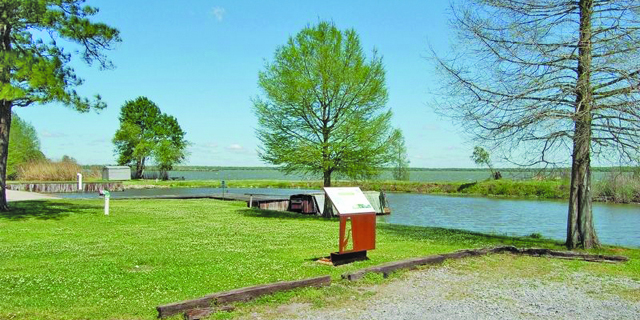Plaques honoring Ambassador Lemelle go up in New Iberia
Published 9:49 am Tuesday, May 6, 2025
Adding historical plaques around the City of New Iberia has been a common occurrence in the past few years, but Saturday’s installation of a plaque honoring Wilbert Le Melle, the inspiration behind Ambassador W. Lemelle Drive, was clearly a special occasion.
City and parish officials, local residents and the family of Le Melle were all present at the St. Edward Catholic Church Family Life Center Saturday afternoon to celebrate the installation of the historical plaque, as well as to pay tribute to one of New Iberia’s most consequential figures in the 20th century.
Breighlynn M. Polk, Executive Director of the IAAHS, noted that the location holds particular significance.
Trending
“Ambassador Le Melle’s ties to St. Edward Catholic Church remained strong throughout his life,” Polk said. “He even returned in 1997 to speak at the school’s 70th anniversary celebration. To honor him at a place so deeply connected to his beginnings—and so central to our community—makes this moment even more special.”
As the street name implies, Le Melle was appointed as an ambassador under President Jimmy Carter, and served in the Republic of Kenya and Republic of Seychelles from 1977 to 1980.
Following his diplomatic service, Le Melle took on educational leadership roles, serving as the vice-chancellor of the State University of New York from 1981 to 1985 and later as the president of what is now Mercy University in New York starting in 1985.
Le Melle led the Phelps Stokes Fund, a non-profit fostering connections between emerging leaders and organizations across Africa and the Americas and also served on the boards of Borden, the Public Broadcasting System and Chase NBW National Bank of Westchester. He was a member of the Council on Foreign Relations and the Carnegie Endowment for International Peace as well.
The decision to honor Ambassador Le Melle, Polk said, comes directly from the IAAHS’s mission to uncover and center African American history in the region’s broader narrative. Though he and another Acadiana native both earned the rare distinction of serving as U.S. ambassadors, only one has been widely recognized in the region with a prominent street. Polk believes Ambassador Le Melle’s achievements more than merit a place in the public memory.
“His life is a testament to the power of education, service, and perseverance,” Polk said. “By honoring him, we’re not just celebrating one remarkable individual—we’re reinforcing the idea that African American stories are integral to the history of Iberia Parish.”
Trending
Frere Street in New Iberia was renamed in his honor in 1997, and he remained a strong influence until his death in 2003.
The highlight of the event was Le Melle’s family, many of whom flew out to New Iberia to witness the occasion. It was evident that the work ethic and success of Le Melle had rubbed off on his children and grandchildren, who had impressive resumes of their own.
Le Melle’s son, Gerald Le Melle, is a partner at a prestigious law firm and has worked as a leading advocate of for immigration reform, serving as deputy executive director of Amnesty International from 1995 to 2007 and executive director of Africa Action, the former U.S. Committee on Africa, from 2007-2010.
Gerald Le Melle remembered his father as a man dedicated to public service who carried the values of the community he came from, building bridges between nations and a belief in the transformative power of education.
“He spoke of New Iberia with pride and affection, teaching the lessons he taught here in family, faith and perseverance,” he said.
The plaque installation was accompanied with a ceremony that saw a wide community turnout, and included music and speeches from Le Melle’s family as well as local officials.
This new marker joins a growing collection of historical recognitions led by the IAAHS. Previous markers, such as those honoring Queen Mother Moore and Dr. Emma Wakefield-Paillet, have helped shift the community’s understanding of its past. Polk noted that the marker for Queen Mother Moore in particular sparked a groundswell of support, inspiring families to donate photographs, documents, and artifacts to the IAAHS’s Center for Research and Learning.
“Each marker we install is a step toward a fuller, more inclusive history of Iberia Parish,” Polk said. “We want to ensure that the achievements and struggles of African Americans are not relegated to the margins but placed at the center of our shared story.”
The IAAHS’s work continues to generate momentum beyond the markers themselves. In April 2025, the publication of Were You There? – The Biography of Emma Wakefield-Paillet by UL Press further elevated the story of the first African American woman to receive a medical degree in Louisiana, connecting local history to broader state and national narratives.






